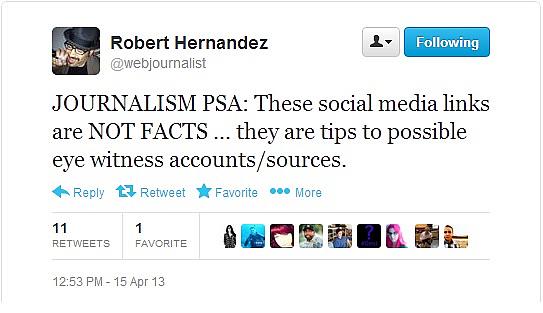J-Prof: New Apps Aid Journalists, But Old Values Still Key

Imagine how differently that tragic afternoon of Nov. 22, 1963, would have unfolded in the digital era. Facebook and Twitter streams would overflow with news of President John F. Kennedy’s assassination in Dallas. In place of the silent 8-millimeter Zapruder film would be hundreds of high-resolution smartphone photos and videos, available instantly to the public.
Media coverage of the Boston Marathon explosions relied primarily on these social media feeds, broadcasting images credited to Twitter and Instagram users at the scene before camera crews arrived. In the time of crisis, any citizen with a phone and a social network becomes a one-man news team: photographer, anchor, commentator – and any Redditor with an eagle eye becomes an investigator.
But how do these social media tools aid professional journalists during such a crisis? As Monday’s events developed, and as the number of questions, injuries and unverified headlines rose, Robert Hernandez, assistant professor of professional practice at USC’s Annenberg School, Tweeted throughout the day about multimedia tools assisting the spread of information.
Hernandez, known as one of the true veterans of web journalism, teaches web programming and social media, mapping and data-gathering tools in his Advanced Multimedia Storytelling class in the Annenberg School. After the Boston attacks, Reporting on Health asked him a few questions about multimedia coverage of breaking, tragic events.
What web tools did you find most effective in spreading news about the bombings?
The fastest tool, for me, is Twitter. It is truly real time and mobile, which means people are gathering and spreading information quickly. That comes with a price, of course, which is some information may be inaccurate. So I advise people to use caution and common sense when engaging with Twitter.
The most powerful tool I used in following the coverage was hearing the police scanners through Broadcastify. It’s raw source information, providing tips and developments. But, like Twitter, proceed with caution and common sense. This was information out of context and early reports.
Any new apps that you were especially impressed by?
A new app I experimented with is Banjo. It reviews multiple social media platforms and gathers content by location. It's a great concept.
A tool I forgot to use is Facebook’s graphical search. In demos it has potential to tap into the largest social network's users' content. With this search you can look for images from friends or public posts connected to a location. It has incredible potential.
In general, how has the nature of breaking news and tragedy coverage changed since the age of social media began?
It's changed dramatically. Everything is in real time and, as important, everyone is transmitting. Everyone near that finish line took photos and video via their phone. Some posted it on Instagram or Tweeted it out. Other people checked into the location via Foursquare. And many others shared their race time on Facebook or numerous other social platforms. And they all turned to those platforms again when tragedy struck. For better or worse, everyone takes to their phone to capture these moments.
(There is) potentially a lot of noise drowning out important information – and when news hits, potential misinformation mixed in with vital, factual information. Things have changed, and we reporters need to embrace these tools, but be aware of both the benefits and the dangers.
Any tips for new reporters covering events like this?
First and foremost, we use technology to help our journalism. It does not replace what we do, but it does affect it and empower us to do journalism better. Second is that old saying, “If your mom says she loves you, check it out.” If she Tweets or Instagrams you, check it out too. The core values – the "traditional" ones – are as important as ever. Verify. Confirm. Get it right, ethically. And if you make a mistake, own up to it. Be transparent.
The most important thing we have as journalists is credibility. It takes years of hard work to build it up but one split-second bad decision to lose it.
*****
As for the JFK assassination, Hernandez imagines a much clearer, more immediate outcome with the assistance of smartphones and social media.
"We'd probably know if there was a second shooter on the grassy knoll."
This interview was edited and condensed.

